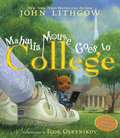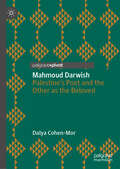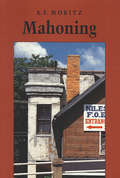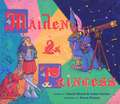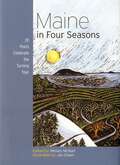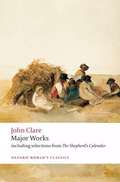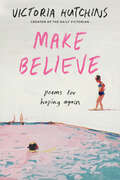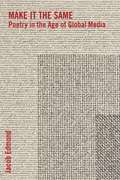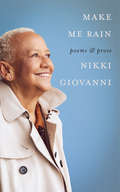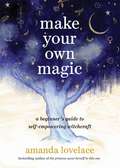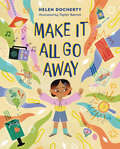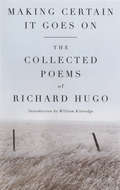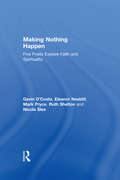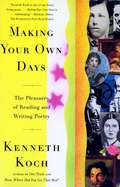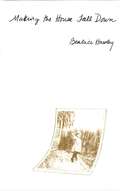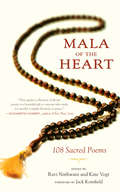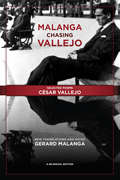- Table View
- List View
Mahadevi Rachna Sanchayan
by Vishwanath Prasad TiwariMahadevi Rachna Sanchayan is the collection of the stories and poems taken from Verma's personal and social life. It describes the pathetic condition of the neglected, depressed and humiliated society.
Mahakavi Subramania Bharathiyarin Vinayakar Naanmanimaalai
by C. Subramaniya BharathiyarThe national poet Bharathi was believed to have composed these poems glorifying the Manakkula Vinayakar of Puducherry in forty verses.
Mahakavi Ulloor
by Sukumar AzhicodeSukumar Azhicode, residing in Thrissur, is known for his poems in Malayalam.
Mahalia Mouse Goes to College
by John LithgowMahalia Mouse and her family live underneath Dunster House, an old Harvard dormitory. Foraging for food for her younger brothers and sisters, Mahalia gets trapped in a backpack and then finds herself inside a classroom far from home. Mahalia, intrigued by the lecture, starts attending classes and soon becomes a full-time student -- all the while wondering about the fate of her family. But when graduation day finally arrives, Mahalia has a wonderful surprise waiting for her. Written as part of his keynote address at Harvard's commencement, this latest book from John Lithgow (class of '67) incorporates his trademark witty rhymes and includes a CD of him reading the text at the commencement. Mahalia's story has an inspiring message for graduates or anyone whose success is worthy of celebration.
Mahmoud Darwish: Palestine’s Poet and the Other as the Beloved
by Dalya Cohen-MorMahmoud Darwish: Palestine’s Poet and the Other as the Beloved focuses on Palestinian national poet Mahmoud Darwish (1941–2008), whose poetry has helped to shape Palestinian identity and foster Palestinian culture through many decades of the Israeli-Palestinian conflict. Dalya Cohen-Mor explores the poet’s romantic relationship with “Rita,” an Israeli Jewish woman whom he had met in Haifa in his early twenties and to whom he had dedicated a series of love poems and prose passages, among them the iconic poem “Rita and the Gun.” Interwoven with biographical details and diverse documentary materials, this exploration reveals a fascinating facet in the poet’s personality, his self-definition, and his attitude toward the Israeli other. Comprising a close reading of Darwish’s love poems, coupled with many examples of novels and short stories from both Arabic and Hebrew fiction that deal with Arab-Jewish love stories, this book delves into the complexity of Arab-Jewish relations and shows how romance can blossom across ethno-religious lines and how politics all too often destroys it.
Mahoning
by A. F. MoritzFew artists (one thinks of Rilke and Hopkins) have presumed to evoke the spirit of embodied Nature. A. F. Moritz not only succeeds in thus animating a living world, but he deals with our human presence and assault on it with sympathy and a larger vision than the misanthropy such injuries easily summon. This is nature poetry with a difference: through Moritz's landscapes, from the abandoned industries of the Rust Belt to the decaying monuments of vanished civilization, move the vivid and engaging characters we have come to expect from this clear-eyed and open-hearted poet.
Mahzoor and After: An Anthology of Modern Kashmiri Poetry
by Tilokinath RainaAn anthology of modern Kashmiri poetry
Mai Dilli Hu
by Ramavtar TyagiThe history of Delhi is presented in the form of poetry. The book tries to put both the story and poem together. The history of Delhi has been put in the chronological way.
Maiden & Princess
by Daniel Haack Isabel GalupoIn this modern fairy tale, a strong, brave maiden is invited to attend the prince's royal ball, but at the dance, she ends up finding true love in a most surprising place."The prince is smart and strong,"she confided in her mother."But if I'm being honest,I see him as a brother."Her mother said, "Just go!And have a bit of fun.The prince might not be right,but you could meet the one."Once in a faraway kingdom, a strong, brave maiden is invited to attend the prince's royal ball, but she's not as excited to go as everyone else. After her mother convinces her to make an appearance, she makes a huge impression on everyone present, from the villagers to the king and queen, but she ends up finding true love in a most surprising place. This book is published in partnership with GLAAD to accelerate LGBTQ inclusivity and acceptance.
Main Maseeha Nahin: मैं मसीहा नहीं
by Sonu Sood Meena K. Iyerकभी-कभार ब्रह्मांड का कोई छोटा सा संकेत इंसान को उसके जीवन का उद्देश्य ढूँढ़ने में मदद कर देता है। अगर अभिनेता सोनू सूद एक मशहूर हस्ती के रूप में अपने शानो-शौकत से भरे जीवन को तवज्जो देते रहते और सिर्फ रिमोट कंट्रोल से अपनी उदारता दर्शाते, तो वह कभी भी भारत के प्रवासी मजदूरों के दर्द से रूबरू नहीं होते या कभी यह नहीं समझ पाते कि भोजन का महज़ एक पैकेट कभी भी किसी मजदूर को घर भेजे जाने के इंतज़ाम का विकल्प नहीं हो सकता। कोविड-19 महामारी के समय राष्ट्रव्यापी लॉकडॉन के दौरान जब गरीब मजदूरों के झुंड का झुंड अपने सुदूर गाँवों की तरफ रवाना हुआ, तो उनके माता-पिता का सिखाया हुआ सेवा का संस्कार सोनू सूद के अंदर जाग उठा और वे तुरंत हरकत में आ गए। उन्होंने सामने आकर मोर्चा संभाला और दुखी-पीड़ित लोगों के पास पहुँचे। उन्होंने समर्पित लोगों की टीम बनाई और देश और विदेश से भी लोगों को उनके घर लौटाने का इंतज़ाम किया। ऐसा करके उन्होंने हज़ारों असहाय और ज़रूरतमंद श्रमिकों की मदद की। इस तरह एक मानवतावादी मिशन के तौर पर उनका घर “भेजो अभियान” शुरू हुआ। इसके लिए उन्होंने चार्टर्ड फ्लाइट, बसों और ट्रेनों को सेनिटाइज़ करवाया और उसका ख़र्च वहन किया। दुनिया भर के लोगों से आ रही दुख भरी फोन कॉल्स को सुनने और जवाब देने का उन्होंने इंतज़ाम करवाया। जल्द ही वह अभियान नौकरी दिलवाने, चिकित्सा सुविधा मुहैया करवाने और श्रमिकों को शैक्षणिक सहायता मुहैया करवाने में तब्दील हो गया। फिल्मी पर्दे का वह खलनायक वास्तविक जीवन में लोगों के सामने एक कद्दावर नायक की तरह प्रकट हुआ। अपने संस्मरण मैं मसीहा नहीं (आई एम नो मसीहा का हिंदी अनुवाद) में सोनू सूद मोगा से मुंबई तक की अपनी असाधारण यात्रा अनुभवों को वरिष्ठ पत्रकार और लेखिका मीना के. अय्यर के शानदार लेखकीय कौशल के साथ प्रस्तुत कर रहे हैं। यह ईमानदार, प्रेरक और दिल को छूने वाली कहानी सोनू सूद की है और उन लोगों की है जिनके जीवन को वह लगातार परिवर्तित करने के अभियान में जुटे हुए हैं।
Maine in Four Seasons: 20 Poets Celebrate the Turning Year
It is a commonplace that poetry is the literary form that best expresses our deepest feelings. Those who seldom read poetry regularly turn to it for weddings or funerals. The poems in this gift-size anthology speak to the seasons of Maine, celebrating familiar scenery and events in a common language. The 20 poems (five for each season) represent the range of seasonal landscapes and activities from the coast to the northernmost border.
Major Works
by Eric Robinson David Powell John Clare Tom PaulinThis authoritative edition was originally published in the acclaimed Oxford Authors series under the general editorship of Frank Kermode. It brings together a generous selection of Clare's poetry and prose, including autobiographical writings and letters. John Clare (1793-1864) is now recognized as one of the greatest English Romantic poets, after years of indifference and neglect. Clare was an impoverished agricultural laborer, whose genius was generally not appreciated by his contemporaries, and his later mental instability further contributed to his loss of critical esteem. But the extraordinary range of his poetical gifts has restored him to the company of his contemporaries Byron, Keats, and Shelley, and this fine selection illustrates all aspects of his talent. It contains poems from all stages of his career, including love poetry, and bird and nature poems. Written in his native Northamptonshire, Clare's work provides a fascinating reflection of rural society, often underscored by his own sense of isolation and despair. Clare's writings are here presented with the minimum of editorial interference, and with a new Introduction by the poet and scholar Tom Paulin.
Make Believe: Poems for Hoping Again
by Victoria HutchinsAn exquisite poetry collection from the creator of The Daily Victorian that celebrates the hidden versions of ourselves, and unveils the healing power of nostalgia, imagination, and hope&“This is for anyone who doesn&’t see deep feeling as a bad thing but would appreciate a warm and talented companion while they do it.&”—Mari Andrew, New York Times bestselling author of Am I There Yet?Maybe you're not old enough yet to believe in fairy tales again. But you can take a walk with optimism. You can hear her out when she tells you the universe is conspiring in your favor, and can keep your eyes peeled for signs that she&’s right.Victoria Hutchins&’s debut Make Believe is a reclamation of wonder and an invitation to return to childlike joy, wielding nostalgia and memory as lenses to imagine a fuller life. These poems pave a path of reconnection to our bodies, our past, our desires, and our wonder—beckoning readers to discover a world worth holding on to. Make Believe is for anyone who wants to take back the narrative of their life, whose body often feels like an enemy to their soul, or who might be struggling to stick around. This book will inspire readers to go out looking, heart in hand, for joy, purpose, and healing.With Hutchins&’s trademark sensory and evocative language throughout, Make Believe contains both viral spoken-word pieces and never-before-shared writing. Ultimately pointing readers toward transformation, Hutchins invites you to imagine: What would happen if you allowed yourself to believe again—in dreams and miracles, but mostly in yourself?
Make It the Same: Poetry in the Age of Global Media (Literature Now)
by Jacob EdmondThe world is full of copies. This proliferation includes not just the copying that occurs online and the replication enabled by globalization but the works of avant-garde writers challenging cultural and political authority. In Make It the Same, Jacob Edmond examines the turn toward repetition in poetry, using the explosion of copying to offer a deeply inventive account of modern and contemporary literature.Make It the Same explores how poetry—an art form associated with the singular, inimitable utterance—is increasingly made from other texts through sampling, appropriation, translation, remediation, performance, and other forms of repetition. Edmond tracks the rise of copy poetry across media from the tape recorder to the computer and through various cultures and languages, reading across aesthetic, linguistic, geopolitical, and technological divides. He illuminates the common form that unites a diverse range of writers from dub poets in the Caribbean to digital parodists in China, samizdat wordsmiths in Russia to Twitter-trolling provocateurs in the United States, analyzing the works of such writers as Kamau Brathwaite, Dmitri Prigov, Yang Lian, John Cayley, Caroline Bergvall, NourbeSe Philip, Kenneth Goldsmith, Vanessa Place, Christian Bök, Yi Sha, Hsia Yü, and Tan Lin. Edmond develops an alternative account of modernist and contemporary literature as defined not by innovation—as in Ezra Pound’s oft-repeated slogan “make it new”—but by a system of continuous copying. Make It the Same transforms global literary history, showing how the old hierarchies of original and derivative, center and periphery are overturned when we recognize copying as the engine of literary change.
Make Me Rain: Poems & Prose
by Nikki GiovanniOne of America’s most celebrated poets challenges us with this powerful and deeply personal collection of verse that speaks to the injustices of society while illuminating the depths of her own heart.For more than thirty years, Nikki Giovanni’s poetry has inspired, enlightened, and dazzled readers. As sharp and outspoken as ever, this artist long hailed as a healer and a sage returns with this profound book of poetry in which she continues to call attention to injustice and give readers an unfiltered look into the most private parts of herself.In Make Me Rain, she celebrates her loved ones and unapologetically declares her pride in her black heritage, while exploring the enduring impact of the twin sins of racism and white nationalism. Giovanni reaffirms her place as a uniquely vibrant and relevant American voice with poems such as “I Come from Athletes” and “Rainy Days”—calling out segregation and Donald Trump; as well as “Unloved (for Aunt Cleota)” and “”When I Could No Longer”—her personal elegy for the relatives who saved her from an abusive home life. Stirring, provocative, and resonant, the poems in Make Me Rain pierce the heart and nourish the soul.
Make Your Own Magic: A Beginner's Guide to Self-Empowering Witchcraft
by Amanda LovelaceFrom the bestselling author of the princess saves herself in this one comes an accessible guide to welcoming magic into your life, perfect for beginner witches and the magic-curious alike. As witchcraft grows ever more popular, there are countless introductions and paths into magical practice to choose from—so many that you might not know where to begin. When you&’re just getting started, it&’s easy to be intimidated or discouraged or to feel that there&’s no place for you in the craft. With make your own magic, amanda lovelace aims to change that. This inviting beginner&’s guide shows that magic doesn&’t have to be fancy, time-consuming, or one-size-fits-all. It introduces the tenets of witchcraft so that you can develop your own practice and relationship with magic in whatever way works for you. With simple explanations, twenty all-new inspiring poems, words of encouragement, magical journaling prompts, and more, this book sweeps away the gatekeeping and offers you the tools needed to begin building a strong, long-lasting practice focused on self-love.
Make it All Go Away
by Helen DochertyOur senses make us feel alive!But sometimes mine can feel too much.They&’re like a fire – too hot to touch.When Melodie&’s family surprises her with a day out, she REALLY doesn&’t want to go.The market is SO SMELLY, the bathrooms are SO LOUD, the food is always SO MUSHY, and the lights are SO BRIGHT. What was supposed to be fun is actually making her feel . . . stressed out. Can she block out the things that bother her and end her day in a calmer place?Inspired by Helen&’s daughter's experiences of sensory overload, this story will resonate with both neurodivergent young readers who want to learn to self-soothe when they feel overwhelmed, as well as the communities eager to better support them. Includes an informative spread on key terms such as masking, stims and sensory overload.
Makhdoom Muhiuddin
by Nishat ZaidiWorks on Ghazals and poems by Mumbai based poet Makhdoom Mohiuddin.
Making Certain It Goes On: The Collected Poems of Richard Hugo
by Richard Hugo William KittredgeThe definitive collection of a major American poet's work. Richard Hugo was, in James Wright's words, "a great poet, true to our difficult life." Making Certain It Goes On brings together, as Hugo wished, the poems published in book form during his lifetime, together with the new poems he wrote in his last years.
Making Nothing Happen: Five Poets Explore Faith and Spirituality
by Eleanor Nesbitt Gavin D'Costa Mark Pryce Ruth SheltonMaking Nothing Happen is a conversation between five poet-theologians who are broadly within the Christian tradition - Nicola Slee, Ruth Shelton, Mark Pryce, Eleanor Nesbitt and Gavin D'Costa. Together they form The Diviners - a group which has been meeting together for a number of years for poetry, and theological and literary reflection. Each poet offers an illuminating reflection on how they understand the relation between poetry and faith, rooting their reflections in their own writing, and illustrating discussion with a selection of their own poems. The poets open up issues for deeper exploration and reflection, including: the nature of creativity and the distinction between divine and human creation; the creative process as exploration, epiphany and revelation; the forging of identity through writing; ways in which the arts reflect, challenge and dialogue with faith, and faith can inform and challenge the arts; power and voice in poetry and faith; and ways in which race, gender and culture interact with and shape poetic and theological discourse. This book will be of interest to poets and theologians, to all who read poetry and are interested in the connections between literature and faith, to those seeking inspiration for preaching, liturgy and pastoral care, and to those committed to the practice and nurturing of a contemplative attitude to life in which profound attention and respect are offered to words and to the creative Word at work.
Making Your Own Days: The Pleasures of Reading and Writing Poetry
by Kenneth KochFrom one of the most esteemed American poets of the twenty-first century comes a celebration of poetry and an invitation for anyone to experience its beauty and wonder. Full of fresh and exciting insights, Making Your Own Days illuminates the somewhat mysterious subject of poetry for those who read it and for those who write it--as well as for those who would like to read and write it better. By treating poetry not as a special use of language but as a distinct language--unlike the one used in prose and conversation--Koch clarifies the nature of poetic inspiration, how poems are written and revised, and what happens to the heart and mind while reading a poem. Koch also provides a rich anthology of more than ninety works from poets past and present. Lyric poems, excerpts from long poems and poetic plays, poems in English, and poems in translation from Homer and Sappho to Lorca, Snyder, and Ashbery; each selection is accompanied by an explanatory note designed to complement and clarify the text and to put pleasure back into the experience of poetry.
Making the House Fall Down
by Beatrice Hawley"Hawley's spare, emblematic poetry is like the stones she so often writes about: monumental, enduring, clean and insistently its own shape. Stripped to the bone her poems catalogue the minutiae of moments that, except in poetry, have no form." --Jane Barnes, Dark Horse
Mala of the Heart
by Kate Vogt Ravi NathwaniThis collection of timeless poetry celebrates the eternal spiritual truth within each heart. Since ancient times, this hidden essence has been symbolized by the number 108. There are 108 earthly desires, 108 human feelings, 108 delusions, 108 beads in the traditional meditation mala, and 108 sacred poems in this anthology. Filled with crystalline wisdom from the great poets, sages, saints, and mystics, this selection of poems is a collective expression of universal heart-filled wisdom. The poems span a wide range of cultures and civilizations -- from India to Europe, Japan, and the Middle East -- and each one offers a unique perspective about the path to awakening. Some of the poems express belief in a higher being. Some convey instantaneous awakening. Others lead the reader down a disciplined path of contemplation. Ordered according to a broad interpretation of the heart-centered chakra model, these remarkable poems guide the reader toward realization and offer timeless jewels of insight to spark awakening and enrich spiritual practice.
Malanga Chasing Vallejo
by Gerard MalangaIn the forceful, staggering poetry of César Vallejo, poet and photographer Gerard Malanga discovered a kindred spirit. Driven by a deep sense of spiritual kinship and with the encouragement of Vallejo's widow, Malanga's translations reveal a profound perspective on Vallejo's work that brings into focus the brutal desperation behind his genius. Malanga Chasing Vallejo gathers 82 of Vallejo's poems in a bilingual edition that is marked by the spiritual connection between poet and translator. A work of the heart, these poems are presented from the position of a fellow member of the underclass, providing a street-level entry point for readers who can relate to the hunger feeding every verse and the ache of loneliness that no amount of modern technology can obscure. In addition to the poems, Malanga's heartfelt introduction describes the process of his 45-year commitment to this project. The book also includes a poem about Vallejo by Malanga, rare photos of Vallejo, and transcriptions of several never-before-published letters to Malanga from Vallejo's widow, Georgette de Vallejo, which guided his translation efforts.
Malanga Chasing Vallejo: César Vallejo
by César Vallejo Gerard MalangaIn the forceful, staggering poetry of César Vallejo, poet and photographer Gerard Malanga discovered a kindred spirit. Driven by a deep sense of spiritual kinship and with the encouragement of Vallejo's widow, Malanga's translations reveal a profound perspective on Vallejo's work that brings into focus the brutal desperation behind his genius. Malanga Chasing Vallejo gathers 82 of Vallejo's poems in a bilingual edition that is marked by the spiritual connection between poet and translator. A work of the heart, these poems are presented from the position of a fellow member of the underclass, providing a street-level entry point for readers who can relate to the hunger feeding every verse and the ache of loneliness that no amount of modern technology can obscure. In addition to the poems, Malanga's heartfelt introduction describes the process of his 45-year commitment to this project. The book also includes a poem about Vallejo by Malanga, rare photos of Vallejo, and transcriptions of several never-before-published letters to Malanga from Vallejo's widow, Georgette de Vallejo, which guided his translation efforts.

